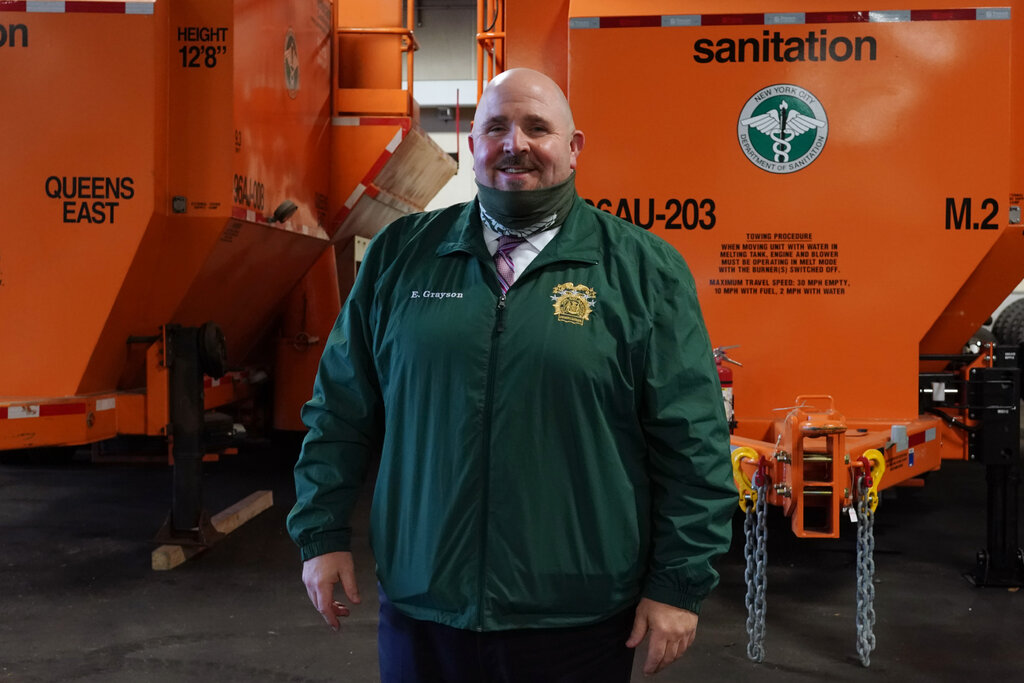The New Leader In NYC Waste Management
Meet The New Nyc Sanitation Commissioner The: Introducing Jessica Tisch
This phrase introduces Jessica Tisch as the newly appointed New York City Sanitation Commissioner, a position responsible for overseeing the city's waste management and sanitation systems. She is the first woman to hold this role.
This change in leadership brings a fresh perspective and focus on improving the city's waste management practices, promoting environmental sustainability, and ensuring the efficient operation of sanitation services.
Meet The New NYC Sanitation Commissioner
The newly appointed NYC Sanitation Commissioner, Jessica Tisch, brings a wealth of experience and expertise to the role. Her key areas of focus include:
- Waste management
- Environmental sustainability
- Sanitation infrastructure
- Public health
- Community engagement
- Fiscal responsibility
- Innovation
- Climate change mitigation
- Employee development
- Customer service
Tisch has a proven track record of success in these areas, having previously served as the Deputy Commissioner for Operations at the NYC Department of Sanitation. She is committed to working with the community and stakeholders to improve the city's waste management system, protect the environment, and ensure the health and safety of all New Yorkers.
Jessica Tisch Bio
| Name | Jessica Tisch ||---|---|| Title | NYC Sanitation Commissioner || Years of Experience | 15+ || Education | BA, Brown University; MPA, Harvard University || Key Accomplishments | Led the implementation of the city's first curbside composting program; oversaw the launch of the city's new recycling program; developed and implemented the city's first comprehensive solid waste management plan |Waste Management
Waste management is a critical component of the role of the NYC Sanitation Commissioner. The Commissioner is responsible for overseeing the city's waste management system, which includes the collection, transportation, and disposal of waste. The Commissioner also develops and implements policies and programs to reduce waste generation and promote recycling and composting.
Waste management is a complex and challenging issue, especially in a city as large and dense as New York City. The city produces over 14 million tons of waste each year, and the Commissioner is responsible for ensuring that this waste is disposed of in a safe and environmentally sound manner. The Commissioner also works to reduce the city's waste generation through public education campaigns and other initiatives.
The Commissioner's work has a major impact on the health and safety of New Yorkers. Proper waste management helps to prevent the spread of disease, reduce air and water pollution, and conserve natural resources. The Commissioner also plays a key role in mitigating climate change by reducing the city's greenhouse gas emissions.
The new NYC Sanitation Commissioner, Jessica Tisch, has made waste management a top priority. She has set a goal of reducing the city's waste generation by 10% by 2030. Tisch is also working to expand the city's recycling and composting programs and to develop new technologies to convert waste into energy.
Environmental Sustainability
Environmental sustainability is a key focus area for the NYC Sanitation Commissioner. The Commissioner is responsible for developing and implementing policies and programs to protect the environment and reduce the city's carbon footprint.
- Waste reduction: The Commissioner works to reduce waste generation through public education campaigns and other initiatives.
- Recycling and composting: The Commissioner oversees the city's recycling and composting programs, which help to divert waste from landfills and incinerators.
- Renewable energy: The Commissioner promotes the use of renewable energy sources, such as solar and wind power, to reduce the city's reliance on fossil fuels.
- Climate change mitigation: The Commissioner works to reduce the city's greenhouse gas emissions through a variety of initiatives, such as promoting energy efficiency and planting trees.
These are just a few of the ways that the NYC Sanitation Commissioner is working to protect the environment and promote sustainability. The Commissioner's work has a major impact on the health and safety of New Yorkers, and it is essential to ensuring the city's long-term sustainability.
Sanitation infrastructure
Sanitation infrastructure encompasses the physical components and systems used to manage waste and maintain public health. It plays a vital role in the well-being of New York City residents and the environment.
- Wastewater treatment plants: These facilities remove pollutants from wastewater, preventing them from contaminating waterways and protecting public health.
- Landfills: Landfills are used to dispose of waste that cannot be recycled or composted. Proper landfill management is essential to prevent environmental and health hazards.
- Recycling and composting facilities: These facilities process recyclables and compostable materials, diverting them from landfills and reducing waste generation.
- Street cleaning equipment: Street sweepers, litter baskets, and other equipment are used to keep the city's streets clean and free of litter and debris.
The NYC Sanitation Commissioner is responsible for overseeing the city's sanitation infrastructure and ensuring its effective operation. This includes planning for future infrastructure needs, investing in new technologies, and ensuring that the city's sanitation workforce is properly trained and equipped.
Public health
Public health is a critical component of the role of the NYC Sanitation Commissioner. The Commissioner is responsible for developing and implementing policies and programs to protect the health of New Yorkers and promote a clean and healthy environment.
One of the most important ways that the Commissioner protects public health is by ensuring the proper collection and disposal of waste. Waste that is not properly disposed of can contaminate the environment and spread disease. The Commissioner also works to reduce the amount of waste generated in the city, which helps to conserve natural resources and reduce pollution.
In addition to waste management, the Commissioner also oversees other public health initiatives, such as street cleaning, rodent control, and mosquito control. These programs help to keep the city clean and free of pests, which can spread disease. The Commissioner also works to educate the public about public health issues and promote healthy behaviors.
The work of the NYC Sanitation Commissioner has a major impact on the health and safety of New Yorkers. By protecting the environment and promoting public health, the Commissioner helps to create a healthier and more livable city for all.
Community engagement
Community engagement is a critical component of the role of the NYC Sanitation Commissioner. The Commissioner is responsible for developing and implementing policies and programs that affect the lives of all New Yorkers, and it is essential to engage with the community to ensure that these policies and programs are responsive to the needs of the people they serve.
There are many ways that the NYC Sanitation Commissioner can engage with the community. One important way is through public meetings and workshops. These events provide an opportunity for the Commissioner to hear directly from the public about their concerns and priorities. The Commissioner can also use these events to educate the public about the work of the Sanitation Department and to explain the rationale behind the Department's policies and programs.
Another important way to engage with the community is through partnerships with community organizations. These partnerships can help the Sanitation Department to reach a wider audience and to build trust with the community. For example, the Sanitation Department has partnered with community organizations to provide educational programs about waste reduction and recycling, and to distribute free composting bins to residents.
Community engagement is essential for the NYC Sanitation Commissioner to be effective in his or her role. By engaging with the community, the Commissioner can ensure that the Sanitation Department's policies and programs are responsive to the needs of the people they serve.
Fiscal responsibility
Fiscal responsibility is a critical component of the role of the NYC Sanitation Commissioner. The Commissioner is responsible for overseeing a budget of over $1 billion and managing a workforce of over 10,000 employees. It is essential that the Commissioner is able to manage the Sanitation Department's finances in a responsible and efficient manner.
There are many ways that the NYC Sanitation Commissioner can demonstrate fiscal responsibility. One important way is through careful budgeting. The Commissioner must ensure that the Sanitation Department's budget is aligned with the city's overall fiscal priorities. The Commissioner must also be able to identify and prioritize the Sanitation Department's most important needs.
Another important way to demonstrate fiscal responsibility is through efficient spending. The Commissioner must ensure that the Sanitation Department is getting the most value for its money. The Commissioner must also be able to identify and eliminate waste and inefficiency.
Fiscal responsibility is essential for the NYC Sanitation Commissioner to be effective in his or her role. By managing the Sanitation Department's finances in a responsible and efficient manner, the Commissioner can ensure that the Department is able to provide essential services to the city of New York.
Innovation
Innovation is a key aspect of the role of the NYC Sanitation Commissioner. The Commissioner is responsible for overseeing a complex and ever-changing waste management system, and innovation is essential to finding new and better ways to manage the city's waste.
- Technology: The Sanitation Department is constantly exploring new technologies to improve its waste management operations. For example, the Department is currently testing a new fleet of electric garbage trucks. These trucks are quieter and produce fewer emissions than traditional diesel trucks, which will help to reduce the Department's environmental impact.
- Processes: The Sanitation Department is also innovating in its processes. For example, the Department is piloting a new program that uses artificial intelligence to identify and sort recyclable materials. This program has the potential to significantly increase the city's recycling rate.
- Partnerships: The Sanitation Department is also partnering with other organizations to develop innovative solutions to waste management challenges. For example, the Department is working with a local university to develop a new type of compostable food packaging.
- Education: The Sanitation Department is also focused on educating the public about waste management. The Department offers a variety of educational programs, including tours of its facilities and workshops on waste reduction and recycling.
Innovation is essential to the NYC Sanitation Commissioner's mission of providing efficient and environmentally sustainable waste management services to the city of New York. By embracing innovation, the Commissioner can help to create a cleaner, healthier, and more sustainable city for all.
Climate change mitigation
Climate change mitigation refers to actions taken to reduce the impact of human activities on the climate system, including reducing greenhouse gas emissions and enhancing carbon sinks. These actions are critical for "Meet The New Nyc Sanitation Commissioner The" as the city aims to achieve ambitious sustainability goals and contribute to global efforts to combat climate change.
- Waste Reduction and Recycling: Promoting waste reduction, recycling, and composting programs helps minimize the amount of waste going to landfills. Decreasing the decomposition of organic waste in landfills reduces methane emissions, a potent greenhouse gas.
- Renewable Energy: Exploring renewable energy sources like solar and wind power for sanitation operations reduces reliance on fossil fuels and lowers carbon emissions. Electrification of sanitation vehicles, such as garbage trucks, further contributes to greenhouse gas reductions.
- Sustainable Infrastructure: Designing and implementing sustainable infrastructure, such as green roofs and rain gardens, can help manage stormwater runoff and reduce the urban heat island effect. These measures contribute to climate change mitigation by reducing energy consumption and mitigating the impact of heavy rainfall events.
- Education and Outreach: Educating the public on responsible waste disposal practices and promoting behavioral changes can lead to reduced waste generation and increased recycling rates. This fosters a culture of environmental stewardship and supports the city's climate mitigation goals.
By prioritizing these facets of climate change mitigation, the NYC Sanitation Commissioner plays a pivotal role in reducing the city's carbon footprint, enhancing resilience to climate impacts, and creating a more sustainable and livable urban environment.
Employee development
Employee development is a critical component of "Meet The New Nyc Sanitation Commissioner The" as it enhances the knowledge, skills, and abilities of the workforce, leading to improved performance and service delivery. The new commissioner recognizes that investing in employee development is essential for fostering a motivated, engaged, and competent workforce capable of meeting the challenges of modern waste management.
Real-life examples of employee development within "Meet The New Nyc Sanitation Commissioner The" include training programs, workshops, and mentorship opportunities. These initiatives provide employees with the tools and support they need to excel in their roles and contribute to the department's overall success. By equipping employees with the latest knowledge and best practices, the commissioner empowers them to make informed decisions, innovate, and drive positive change.
The practical applications of this understanding extend beyond the immediate benefits to employees and the department. A well-trained and developed workforce contributes to a more efficient and effective waste management system, ultimately benefiting the city's residents and the environment. Employee development fosters a culture of continuous learning and improvement, ensuring that the department remains at the forefront of industry best practices and adapts to evolving challenges.
Customer service
Within the broad scope of "Meet The New Nyc Sanitation Commissioner The", customer service plays a pivotal role in fostering positive relationships with the city's residents and businesses, ensuring satisfaction with waste management services. It encompasses various facets, including:
- Responsiveness: Timely and efficient handling of inquiries, complaints, and requests enhances customer satisfaction and trust.
- Communication: Clear and effective communication channels allow customers to easily access information and provide feedback, fostering a sense of transparency and engagement.
- Accessibility: Providing multiple channels for customers to interact, such as phone, email, and social media, ensures convenience and inclusivity.
- Personalized service: Tailoring services and addressing specific customer needs demonstrates a commitment to understanding and meeting their unique requirements, strengthening the relationship between the department and the community.
Prioritizing these aspects of customer service enables "Meet The New Nyc Sanitation Commissioner The" to build a reputation for excellence, fostering a positive image of the department and encouraging active participation in waste management initiatives.
In exploring "Meet The New Nyc Sanitation Commissioner The", this article has shed light on the multifaceted nature of the role, underscoring the importance of waste management, environmental sustainability, and community engagement in shaping a clean, healthy, and livable city. The commissioner's focus on innovation, climate change mitigation, employee development, and customer service further highlights the commitment to excellence and continuous improvement within the department.
Key takeaways include: (1) effective waste management requires a comprehensive approach that encompasses waste reduction, recycling, and responsible disposal; (2) environmental sustainability involves not only reducing the city's carbon footprint but also promoting sustainable practices and infrastructure; and (3) community engagement fosters trust, collaboration, and a shared responsibility in maintaining a clean and healthy city.
As we move forward, the role of "Meet The New Nyc Sanitation Commissioner The" will continue to evolve, necessitating a forward-thinking and adaptive approach to waste management. This includes embracing emerging technologies, fostering a culture of innovation, and working in partnership with stakeholders to create a sustainable and resilient urban environment for future generations.Monty don discovers some of europe s
William mendoza and vanessa candelas death atlanta
Who is olivia ines beauty gonzalez daughter

He Always Wanted to Be a ‘Garbageman.’ Now He’s the Commissioner. The

DSNY The City of New York Department of Sanitation

Who Said ‘The Rats Don’t Run This City. We Do?’ She Did. The New York

Jessica Tisch named NYC Department of Sanitation Commissioner News

Mayor de Blasio Appoints Kathryn Garcia as Department of Sanitation
ncG1vNJzZmiemam7pr%2BNrJ2oal6Ztqi105qjqJuVlru0vMCcnKxmk6S6cLnEnqtmrJiaeq%2Bx1malsptdqK6vtdOaq6KnnmKwsLnMoqqsoZ%2BjsrN506GcZ6Ckork%3D